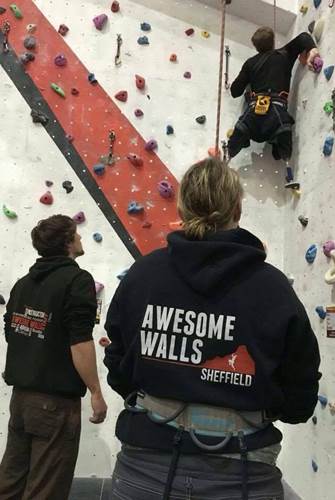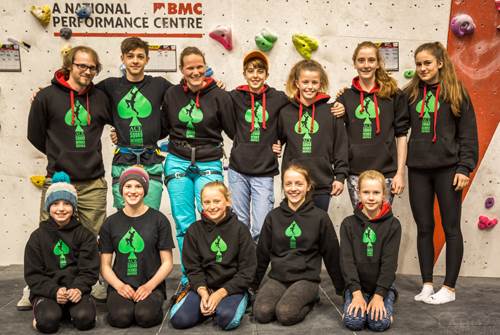The role of Coaching in Indoor Climbing Walls
Zoe Spriggins - Centre Manager at Awesome Walls Sheffield
As a climber, everyone wants to improve. To do this there are several options: climb more, read article after article, speak to friends, try new training methods, eat differently, or book a coaching session.
Attitudes to coaching in climbing are changing, with most commercial walls offering coaching sessions in some form; whether it is with a well-known professional athlete or with one of the employed staff members. As a climbing wall manager, it is important to recognise this.
Instructing is where you pass on the knowledge of the hard skills, e.g. belaying and knot tying. After your climbers have gained the hard skills, coaching comes into play. Coaching is a pedagogical approach, where the advice given by the coach is to be developed. You are giving the climber the tools to practice and continue to improve their climbing. It is a performance-based tool, and if used properly, can help to unlock the potential in all of us.

Everyone working at a climbing wall is taking part in some form of coaching. There comes a point where instructors are no longer instructing, instead they are coaching. I strongly encourage all my staff to attend FUNdamentals workshops (delivered by the
BMC or
Mountaineering Scotland); these help give the basics in supporting climbers with their techniques in a fun way, which can be adapted for both children and adults. Coaching involves understanding the needs of the climber; what do they want to achieve, how much time and effort can they contribute, why do they want to be coached? A good coach will understand this and develop a partnership which will allow the climber to trust the coach and push themselves in a safe environment.
I don’t employ coaches specifically, but hire the people who I feel will fit the team I already have in place and can be developed into coaches. I like to think I am very encouraging and support the staff to follow the most appropriate path for their own personal development. Some staff wish to follow the coaching path, whilst others may wish to develop their route setting skills. I am lucky enough to be the manager of the first Performance Centre in the UK, so coaching is an important aspect of my job role and one which I very much enjoy!
I have attended all of the FUNdamentals workshops including Physical Training for Climbing part 1 and 2. The next step was
Foundation Coach training. Soon after I completed the Foundation Coach training, I also attended the
Development Coach training. I found both courses interesting and I looked forward to trying the new techniques I had developed.
Since then, I have gone onto pass the Foundation Coach assessment. I used this to help set up the Awesome Walls Elite Squad across the 4 centres (ACES) and I used my skills to encourage the staff and make positive changes during our Kids Club sessions. I am regularly coaching climbers two or three times a week and it is very satisfying to see their continued progression.

Several of my staff are now on the coaching pathway and I am looking to pass my Development Coach assessment by the end of this year.
Having qualified coaches is a real selling point, especially with regards to our elite squad. I feel very confident that my skills as a coach are to the standards laid out by Mountain Training. I see a tiered approach for the climbing industry, where each centre will have instructors, Foundation Coaches, Development Coaches and then one Performance Coach. This helps to build a structure, with the Performance Coach overseeing the standards of the other coaches operating at the centre. The coaching qualifications help maintain the quality of the coaching; poor coaching breeds poor climbing.
The future? With the entry of
climbing as an Olympic sport, I feel there will be an explosion in popularity of indoor climbing. Seeing an exciting new sport on the TV, and learning that you can participate in this sport right on your doorstop, will see an increase in the number of people trying climbing for the first time. We will be seen as a mainstream sport, no longer just a high risk, adrenaline fueled sport.
There is a climbing wall in most major cities in the UK. With an increase in participation, especially amongst the youth, the number of providers is likely to increase. Many centres offer kids clubs, squads and/or academies already, and increasing the coaching provision can in turn increase the quality of young climbers. Indoor climbing is a sport in its own right, with many of our customers being exclusive indoor climbers. By training staff to offer a higher quality of coaching and instruction, we can capitalise on the Olympics and firmly put the sport of climbing on the map.
Read more about
Zoe's Mountain Training journey.